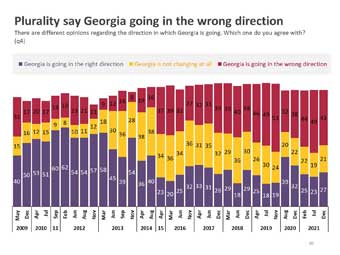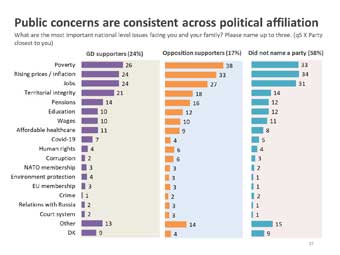
NDI Poll: Deterioration of the Economy at the Forefront of People’s Minds
Friday, January 28, 2022
Poll results released by the National Democratic Institute (NDI or the Institute) and CRRC Georgia on 27th of January finds that Georgians see insufficient progress on the top national issues of concern and think the situation regarding poverty, crime, territorial integrity, and education has gotten worse in the last 10 years. Public concerns are consistent across political affiliation, signaling opportunities for political parties to work together to address the common needs of Georgia’s citizens.
New poll finds that a majority of Georgians do not think anyone - neither government or opposition parties - is acting in their best interest. Georgians also remain skeptical of the newly elected parliament’s willingness to address their concerns. 53% of the population does not believe parliament is passing legislation on issues that matter to them, while 52% do not believe an MP will take action if citizens tell him/her about problems in their district. Only a third believes that parliament regularly communicates with the public.
“Economic insecurity remains a top priority for the Georgian public and provides a clear direction for Government and political parties to respond. A renewed focus on the issues of top concern is required across the political spectrum through Government, Parliament and local councils.” says Alan Gillam, NDI Georgia Country Director.
In light of extreme political polarization, Georgians are supportive of a wide cross-party collaboration. 80% agree that their favorite political party should cooperate with all other political parties in the parliament, even if the views of some parties might be unacceptable to them. This perception is consistent across political affiliation. A majority of Georgians believe that domestic actors are best placed to facilitate mediation between the opposition and the government. A plurality (34%) thinks Georgian political parties themselves would make best facilitators during negotiations, while 11% find the president as a suitable moderator. 18% would look to the international community, believing western partners are needed for negotiations.
“The public clearly have stated that the political parties in Georgia need to work together to resolve these challenges. The need for economic recovery, exacerbated by the pandemic, remain fundamental challenges in the upcoming period and should focus the minds of Government and opposition alike.” Gillam commented.
Although living in a democratic state remains important for the majority (92%), only 39% believe Georgia meets this criteria. Further, 34% think Georgia is no longer a beacon of democracy, while 25% says Georgia has never been a good example of democracy to begin with. Only 23% of citizens agree that Georgia is a good example of democracy for the neighboring states.
Finally, as Covid-19 continues to dominate the lives of citizens across the world, Georgians praise the Government for doing a good job handling the Covid pandemic (50%). What remains alarming is the high level of vaccine hesitancy - 42% said they would not get vaccinated; 29% said they are already vaccinated, 25% said they intend to receive a vaccine. Among those who are hesitant, the main reasons are concerns about the quality of the vaccine (38%) and possible side effects for those with pre-existing health conditions (20%). 34% of vaccinated individuals say they will not get a booster, or are undecided about it.
The results reflect data collected between December 7-13, 2021, through telephone interviews with a nationwide representative sample of Georgia’s adult population, excluding occupied territories, that included 2,099 completed interviews. The average margin of error is +/- 1.4%. Respondents were selected using the random-digit-dial method. This poll was carried out by CRRC Georgia. NDI’s survey work is funded by UK aid from the British people.



